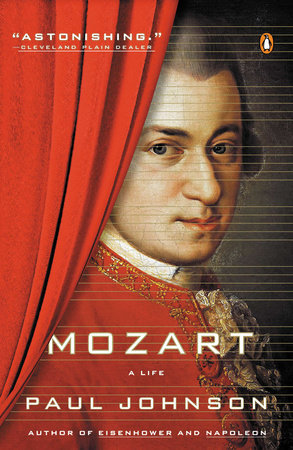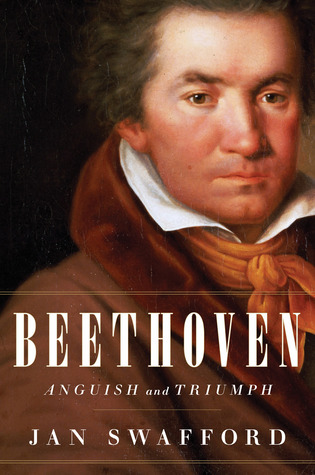
What new information can be gathered from yet another biography of Wolfgang Amadeus Mozart that has not been said in the hundreds (some say more than two thousand) of this musician’s life stories? I am not an expert on Mozart, but some facts are relatively known by all those interested in music. Paul Johnson’s Mozart. A Life (Viking, 2013, pp. 164) is not an academic biography (the author does not cite where his quotations from others come from), nor a biography written for composers by a composer (like the Beethoven’s biography discussed in my post below (Beethoven’s tears). The book is a quick read, written by an obvious aficionado. There is an Epilogue/Appendix by Daniel Johnson entitled “Mozart in London” dealing with Mozart’s visit to that town; this appendix is more a panegyric to London than anything else. The book closes with a short section on Further Reading followed by an Index. My comments are based on what I knew about Mozart’s life and those I found in Johnson’s book.
Mozart and languages
It is part of Mozart’s lore that when he and his sister Nannerl were young, they invented a secret language. It would be interesting to find out what the form of this language was and whether they kept the knowledge of it. Johnson mentions that Mozart probably learnt how to read music notes before knowing how to read words. Not only that, but his facility with learning languages is also brought up: “His father taught him Latin without difficulty. But English he picked up for himself, and the following year he mastered a good deal of Italian. Years after, he is recorded as speaking English fluently and with a good accent.” (p. 14; source of information not indicated). The biography does not go deeper into this topic. One can surmise that as regards Latin, it was the language of the Catholic mass, and as regards Italian, it was the language of the opera, so Mozart had to be in contact with these languages weekly, if not daily. It would be an interesting research to delve into the process of learning languages in Mozart’s time, and especially by him.
Gaieties of life or complexity of character?
Johnson frequently underlines the fact that Mozart’s character leaned greatly towards cheerfulness. “The great thing about Mozart, one reason why people liked him so much, was that he added hugely to the gaieties of life. Gay himself by nature, he saw no reason why people should not enjoy a little innocent pleasure, or not-so-innocent pleasure, for that matter.” (p. 61) Dances, jokes, double-entendres, musical jokes, billiards, all contributed to this enjoyment of life. He loved to dance, and he composed many dance pieces (minuets, gavottes, country dances, waltzes and others), and music for ballet. Family and friends gatherings offered the occasions for not only playing music, trying his new compositions, and discussing them, but also for exchanging new jokes and basically having fun. Mozart’s membership in the Freemasons is well known. It is less discussed (one example may be from the Catholic side https://www.ncronline.org/blogs/all-things-catholic/mozart-masonry-and-catholicism) how this membership, whose purpose is very far from having fun, added to the complexity of Mozart’s character, since gaiety and Masonry have very different rules and may have clashed in the composer’s mind. Add to this Mozart’s faith and his relationship to the Catholic church. Clearly, he was able to incorporate all this in his music, even though his joy, Catholicism and Freemasonry may have clashed, or maybe just because of this clash he was able to create such musical masterpieces.
Offending the ear
In a letter to his father, Mozart writes about the parts in his The Abduction from the Seraglio. There is an interesting thought which Johnson does not dwell on:
… passions, whether violent or not, must never be expressed to the point of disgust, and as music, even in the most terrible situations, must never offend the ear, but must please the listener, or in other words must never cease to be music… (pp. 84-85)
So many questions come to mind stemming from this sentence: What is disgust? How is it expressed in music? What does ‘offending the ear’ mean? Why does Mozart want to please the listener? Is it the composer’s duty to please the listener? Do we have here Mozart’s definition of music as something that does not offend the ear and pleases the listener? Is this definition applicable only to compositions written in the classical style or can/should it be generalized? This Mozart’s opinion perhaps explains why his compositions have been called ‘elegant’ (I don’t remember by whom).
Creating musical problems
Johnson writes, on p. 95, “Because of his early training and exceptional musical intelligence, Mozart found most things easy and loved creating problems for himself and so, invariably, for singers and players. As his letters to his father show again and again, he knew exactly when he made his work hard to play and harder still to get exactly right. It is not true to say that he invented hard passages entirely for their own sake – that would have been perverse and unmusical – but to get an effect, he was ready to make the orchestra “sweat,” as he put it, and the singers to give their utmost.”
Interestingly, Beethoven, too, was prone to compose hard sections and pieces, and he too, was not worried about how the members of the orchestra felt about it (he sent them home to practice!). My interest here stems from the fact that the idea of “difficulty” underpins the manner in which geniuses operate – i.e., they cause their aims to converge at any cost. But there are different levels of difficulty and different types of it. Each pianist has to decide how to approach the difficulties, for ex., found in he sonata K457. From a general perspective, the modern age shuns difficulties, learners are forced to “have fun” learning.
In conclusion, this biography opened up more questions and more topics to delve into, rather than providing answer and solutions to existing queries. It does, moreover, ask us to think slightly differently not about Mozart himself, but about the closest people to him, for ex., we should consider whether his father was really such a monster as he usually is portrayed, or whether Constance was really such a bad housewife as has been written about her. All in all, whether you love Mozart’s music, or not, this biography will not change your mind about this genial composer.

